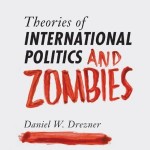Monthly Archives: March 2011
How a government bureaucracy might respond to a zombie outbreak
This paper (PDF) outlines an exercise to simulate a zombie outbreak and theorizes how it would daily operations of government agencies. It was originally written for the University of Florida, according to this article. It seems to provide a good starting point for planning zombie event preparedness. For example, it outlines a few important topics such as:
Phase 3 of the exercise will cover important operational topics such as:
- Proper hygiene during an outbreak;
- Most effective hiding places and refuges should you encounter zombies at home;
- How to properly process and route inarticulate zombie-calls to avoid being accused of failing to adequately support infected UF faculty, staff, and students;
- Situational work practices such as covering windows, barricading doors, and distinguishing between zombie moans and other moaning encountered in the workplace;
- Dispelling myths. For example, contrary to Lawrence (2007), garlic will not stop true zombies,only vampires; and zombies do come out during the day, though they are most active a night because they typically do not like sunlight;
- Policies and procedures for dispatching an infected co-worker.
Book preorders
I’ve added a book preorder in the store. If you want to reserve a copy now, you will get a free Survivor Safety poster and a PDF of the book. Free shipping of course.
Book review: Theories of International Politics and Zombies
 Theories of International Politics and Zombies by Daniel W. Drezner: The appearance of zombies is the ultimate The Black Swan effect. No one can predict exactly how we will respond to them but Drezner does an excellent job in assessing how the most popular theories of international politics would be used to form government policy. The book covers pragmatism (realpolitik), liberalism, neo-conservative ideology and social construction theory to describe broad goals and reactions from the various power groups in government. Neo-conservatives, for example, might conflate the threat represented by an undead horde with the pre-existing ‘axis of evil’ and try to link rogue nation states with zombies. Liberals, of course, would at least consider the rights of the undead.
Theories of International Politics and Zombies by Daniel W. Drezner: The appearance of zombies is the ultimate The Black Swan effect. No one can predict exactly how we will respond to them but Drezner does an excellent job in assessing how the most popular theories of international politics would be used to form government policy. The book covers pragmatism (realpolitik), liberalism, neo-conservative ideology and social construction theory to describe broad goals and reactions from the various power groups in government. Neo-conservatives, for example, might conflate the threat represented by an undead horde with the pre-existing ‘axis of evil’ and try to link rogue nation states with zombies. Liberals, of course, would at least consider the rights of the undead.
The book also describes possible responses in domestic policy, bureaucratic politics and the psychological reaction in the public at large. Given that several dozen government agencies deal with bioterrorism, how many would become involved in a zombie-related crisis? Furthermore our own cognitive biases could hinder our ability to effectively deal with hordes of zombies.
Theories of International Politics and Zombies is an excellent and quick read. It weighs in at 153 pages (the last 39 pages being acknowledgments, notes, references and a thorough glossary) so it can be easily devoured in a few hours. Unlike most books on political theory, the text is clear and concise, explaining how theory can be applied to the undead without being abstruse. Even if you aren’t a fan of the undead, this book provides a good primer to several dominant political theories by showing how they function in a crisis.
700 year old Chinese mummy discovered
 The act of mummification was not limited to the Egyptians, as this recent discovery proves. Chinese road workers found a 700 year old mummy by chance. Who knows if this mummy or other Chinese mummies could awaken and become a species of the undead?
The act of mummification was not limited to the Egyptians, as this recent discovery proves. Chinese road workers found a 700 year old mummy by chance. Who knows if this mummy or other Chinese mummies could awaken and become a species of the undead?
